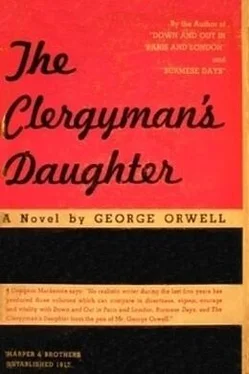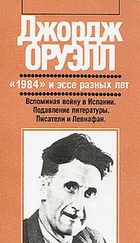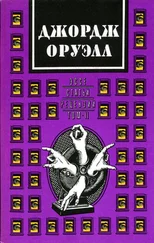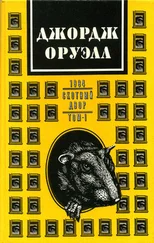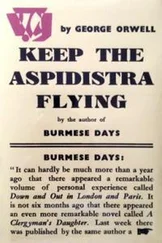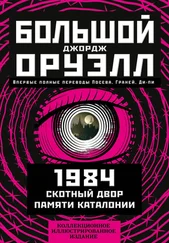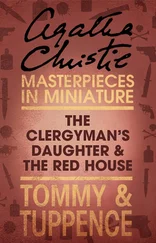'Oh, how could you, how could you?' she sobbed.
'But it appears that I couldn't,' said Mr Warburton.
'Oh, but how could you be such a brute?'
'Oh, THAT? Easily, my child, easily. You will understand that when you get to my age.'
In spite of this bad beginning, a sort of friendship had grown up between the two, even to the extent of Dorothy being 'talked about' in connexion with Mr Warburton. It did not take much to get you 'talked about' in Knype Hill. She only saw him at long intervals and took the greatest care never to be alone with him, but even so he found opportunities of making casual love to her. But it was done in a gentlemanly fashion; the previous disagreeable incident was not repeated. Afterwards, when he was forgiven, Mr Warburton had explained that he 'always tried it on' with every presentable woman he met.
'Don't you get rather a lot of snubs?' Dorothy could not help asking him.
'Oh, certainly. But I get quite a number of successes as well, you know.'
People wondered sometimes how such a girl as Dorothy could consort, even occasionally, with such a man as Mr Warburton; but the hold that he had over her was the hold that the blasphemer and evil– liver always has over the pious. It is a fact—you have only to look about you to verify it—that the pious and the immoral drift naturally together. The best brothel–scenes in literature have been written, without exception, by pious believers or pious unbelievers. And of course Dorothy, born into the twentieth century, made a point of listening to Mr Warburton's blasphemies as calmly as possible; it is fatal to flatter the wicked by letting them see that you are shocked by them. Besides, she was genuinely fond of him. He teased her and distressed her, and yet she got from him, without being fully aware of it, a species of sympathy and understanding which she could not get elsewhere. For all his vices he was distinctly likeable, and the shoddy brilliance of his conversation—Oscar Wilde seven times watered—which she was too inexperienced to see through, fascinated while it shocked her. Perhaps, too, in this instance, the prospect of meeting the celebrated Mr Bewley had its effect upon her; though certainly Fishponds and Concubines sounded like the kind of book that she either didn't read or else set herself heavy penances for reading. In London, no doubt, one would hardly cross the road to see fifty novelists; but these things appeared differently in places like Knype Hill.
'Are you SURE Mr Bewley is coming?' she said.
'Quite sure. And his wife's coming as well, I believe. Full chaperonage. No Tarquin and Lucrece business this evening.'
'All right,' said Dorothy finally; 'thanks very much. I'll come round—about half past eight, I expect.'
'Good. If you can manage to come while it is still daylight, so much the better. Remember that Mrs Semprill is my next–door neighbour. We can count on her to be on the qui vive any time after sundown.'
Mrs Semprill was the town scandalmonger—the most eminent, that is, of the town's many scandalmongers. Having got what he wanted (he was constantly pestering Dorothy to come to his house more often), Mr Warburton said au revoir and left Dorothy to do the remainder of her shopping.
In the semi–gloom of Solepipe's shop, she was just moving away from the counter with her two and a half yards of casement cloth, when she was aware of a low, mournful voice at her ear. It was Mrs Semprill. She was a slender woman of forty, with a lank, sallow, distinguished face, which, with her glossy dark hair and air of settled melancholy, gave her something the appearance of a Van Dyck portrait. Entrenched behind a pile of cretonnes near the window, she had been watching Dorothy's conversation with Mr Warburton. Whenever you were doing something that you did not particularly want Mrs Semprill to see you doing, you could trust her to be somewhere in the neighbourhood. She seemed to have the power of materializing like an Arabian jinneeyeh at any place where she was not wanted. No indiscretion, however small, escaped her vigilance. Mr Warburton used to say that she was like the four beasts of the Apocalypse—'They are full of eyes, you remember, and they rest not night nor day.'
'Dorothy DEAREST,' murmured Mrs Semprill in the sorrowful, affectionate voice of someone breaking a piece of bad news as gently as possible. 'I've been so WANTING to speak to you. I've something simply DREADFUL to tell you—something that will really HORRIFY you!'
'What is it?' said Dorothy resignedly, well knowing what was coming—for Mrs Semprill had only one subject of conversation.
They moved out of the shop and began to walk down the street, Dorothy wheeling her bicycle, Mrs Semprill mincing at her side with a delicate birdlike step and bringing her mouth closer and closer to Dorothy's ear as her remarks grew more and more intimate.
'Do you happen to have noticed,' she began, 'that girl who sits at the end of the pew nearest the organ in church? A rather PRETTY girl, with red hair. I've no idea what her name is,' added Mrs Semprill, who knew the surname and all the Christian names of every man, woman, and child in Knype Hill.
'Molly Freeman,' said Dorothy. 'She's the niece of Freeman the greengrocer.'
'Oh, Molly Freeman? Is THAT her name? I'd often wondered. Well—'
The delicate red mouth came closer, the mournful voice sank to a shocked whisper. Mrs Semprill began to pour forth a stream of purulent libel involving Molly Freeman and six young men who worked at the sugar–beet refinery. After a few moments the story became so outrageous that Dorothy, who had turned very pink, hurriedly withdrew her ear from Mrs Semprill's whispering lips. She stopped her bicycle.
'I won't listen to such things!' she said abruptly. 'I KNOW that isn't true about Molly Freeman. It CAN'T be true! She's such a nice quiet girl—she was one of my very best Girl Guides, and she's always been so good about helping with the church bazaars and everything. I'm perfectly certain she wouldn't do such things as you're saying.'
'But, Dorothy DEAREST! When, as I told you, I actually saw with my own eyes … '
'I don't care! It's not fair to say such things about people. Even if they were true it wouldn't be right to repeat them. There's quite enough evil in the world without going about looking for it.'
'LOOKING for it!' sighed Mrs Semprill. 'But, my dear Dorothy, as though one ever wanted or NEEDED to look! The trouble is that one can't HELP seeing all the dreadful wickedness that goes on in this town.'
Mrs Semprill was always genuinely astonished if you accused her of LOOKING for subjects for scandal. Nothing, she would protest, pained her more than the spectacle of human wickedness; but it was constantly forced upon her unwilling eyes, and only a stern sense of duty impelled her to make it public. Dorothy's remarks, so far from silencing her, merely set her talking about the general corruption of Knype Hill, of which Molly Freeman's misbehaviour was only one example. And so from Molly Freeman and her six young men she proceeded to Dr Gaythorne, the town medical officer, who had got two of the nurses at the Cottage Hospital with child, and then to Mrs Corn, the Town Clerk's wife, found lying in a field dead drunk on eau–de–Cologne, and then to the curate at St Wedekind's in Millborough, who had involved himself in a grave scandal with a choirboy; and so it went on, one thing leading to another. For there was hardly a soul in the town or the surrounding country about whom Mrs Semprill could not disclose some festering secret if you listened to her long enough.
It was noticeable that her stories were not only dirty and libellous, but they had nearly always some monstrous tinge of perversion about them. Compared with the ordinary scandalmongers of a country town, she was Freud to Boccaccio. From hearing her talk you would have gathered the impression that Knype Hill with its thousand inhabitants held more of the refinements of evil than Sodom, Gomorrah, and Buenos Aires put together. Indeed, when you reflected upon the lives led by the inhabitants of this latter–day City of the Plain—from the manager of the local bank squandering his clients' money on the children of his second and bigamous marriage, to the barmaid of the Dog and Bottle serving drinks in the taproom dressed only in high–heeled satin slippers, and from old Miss Channon, the music–teacher, with her secret gin bottle and her anonymous letters, to Maggie White, the baker's daughter, who had borne three children to her own brother—when you considered these people, all, young and old, rich and poor, sunken in monstrous and Babylonian vices, you wondered that fire did not come down from Heaven and consume the town forthwith. But if you listened just a little longer, the catalogue of obscenities became first monstrous and then unbearably dull. For in a town in which EVERYONE is either a bigamist, a pederast, or a drug–taker, the worst scandal loses its sting. In fact, Mrs Semprill was something worse than a slanderer; she was a bore.
Читать дальше
